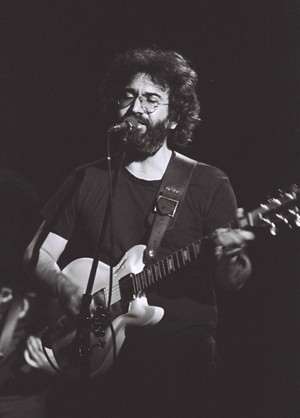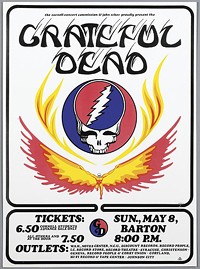Grateful Dead live on in alumni memories of Barton Hall '77
By Daniel Aloi
A 1977 concert in Barton Hall, widely considered one of the best shows in the Grateful Dead's 30-year career, was a key event for those who were there. Some alumni fans are returning to Barton for a Feb. 14 "Furthur" concert by Grateful Dead members Bob Weir and Phil Lesh.
The venue's legendary association with the band still draws Deadheads old and young -- the Furthur show sold 4,300 of 5,000 tickets in one week, on its way to a sellout; and New York Times readers reaffirmed the long-held preference of aficionados and voted Barton '77 the best Dead show of all time in an April 2009 online poll.
"The Cornell show is right up there at the top," says Mike McEvoy '78, one of several Cornell Concert Commission alumni who recalled their love of the band and events surrounding the May 8, 1977 concert.
"I am from San Francisco and a serious Deadhead, the kind whose mom would gather neighborhood kids to get lottery tickets for the New Years' Eve shows [at Winterland]," says Brad Krakow '78.
Barbara Lang '77, then in charge of the commission's hospitality committee, "had a strict rule against groupies," Krakow says. "I clearly violated this in every way -- including my rejected idea for loaves of elaborately decorated 'Grateful Bread.' Somehow I convinced her that I'd behave. As the steward at Sigma Chi, I had access to a kitchen, so this was used for prep."
Lang remembers helping the band's personal chef cook meals for the musicians while she fed the road crew.
"I loved cooking for the roadies, usually more than the performers," Lang says. "Rather than bring in prepared food or fast food, I would always prepare the food myself, and the roadies really appreciated it. … A rather 'crisp' group of workers, to say the least."
Krakow recalls seeing keyboard player Keith Godchaux asleep on a folding table backstage before the show, and an encounter with drummer Bill Kreutzmann.
"You may notice that this is one of the few shows that does not have a drum solo -- I know why," Krakow says. "Bill [asked me] if I had some drug I had never heard of, as his wrist was killing him. There was my chance to be a hero of rock and roll. ... I could barely afford beer back then, much less exotic painkillers. I mumbled something about looking for aspirin, and he went looking for a more supportive local."
A freak May snowstorm the day of the show led to another kind of indelible memory for one anonymous alum and a hundred fellow Deadheads: "I sold acid and bumper stickers … an eventful and unforgettable day. We broke into the building across from Barton Hall [because] of the snow, 100 or more of us, many tripping, and smoked pot in there until the doors opened."
After an audience member's tape and a high-quality soundboard recording began circulating among fans, the show became legendary.
"I started hearing from other Deadheads that the Barton show was famous," says Krakow, who characterized the Dead's performance as "tight, no mistakes and inspired. It is funny now when friends ask if that is 'The' Barton Hall when visiting. It is an icon."
McEvoy later moved to the San Francisco Bay Area and worked for concert promoter Bill Graham for five years, using skills he'd honed at Cornell.
"I was responsible for booking the Dead show at Cornell," McEvoy says. "It took a lot of arm-twisting … over many months, but [it] was well worth it. Being part of the Concert Commission was the best part of my Cornell experience."
After 32 years, and the deaths of Godchaux in 1980 and guitarist Jerry Garcia in 1995, many fans remain loyal to the band they saw that night.
"I've had a three-CD set of the May 8 show since 1998 and treasure it," McEvoy says.
Media Contact
Get Cornell news delivered right to your inbox.
Subscribe
